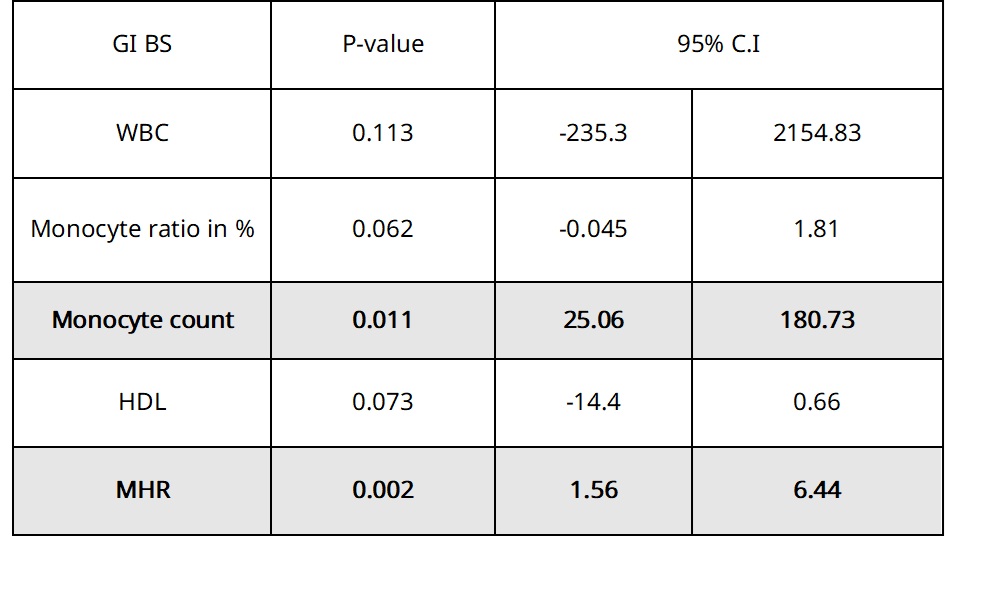Session Information
Date: Tuesday, October 28, 2025
Title: (2524–2546) Vasculitis – Non-ANCA-Associated & Related Disorders Poster III
Session Type: Poster Session C
Session Time: 10:30AM-12:30PM
Background/Purpose: Behçet syndrome (BS) is a chronic multisystem vasculitis marked by recurrent mucocutaneous and ocular inflammation, and in a subset of patients, gastrointestinal (GI) involvement. Gastrointestinal BS (GIBS) is a clinically important phenotype due to its potential for severe morbidity and its diagnostic overlap with other inflammatory bowel disorders. Timely identification of GIBS remains a clinical challenge, often requiring invasive procedures such as colonoscopy. Thus, there is growing interest in identifying noninvasive biomarkers that can aid in risk stratification and guide diagnostic decision-making. The monocyte-to-high-density lipoprotein cholesterol ratio (MHR), reflecting both systemic inflammation and lipid-related oxidative stress, has emerged as a potential biomarker in several immune-mediated diseases. However, its utility in Behçet syndrome, particularly in detecting GI involvement, has not been established. This study aimed to evaluate the clinical significance of MHR in identifying gastrointestinal involvement in BS patients.
Methods: We retrospectively analyzed 2,074 patients with BS registered in the Clinical Data Warehouse of Inha University Hospital from January 1997 to December 2024. Diagnosis was based on the ISG (1990) and ICBD (2013) criteria. Patients were included if they underwent colonoscopy at or after diagnosis and had HDL cholesterol measured at a time point close to the colonoscopy. Exclusion criteria were infectious colitis, malignancies, or MHR data obtained outside the clinically relevant time window. MHR was calculated by dividing absolute monocyte count (/mm³) by HDL cholesterol (mg/dL). Statistical analysis was performed using independent t-tests, with p < 0.05 considered significant.
Results: Among 86 eligible patients, 34 (39.5%) exhibited GI involvement. MHR was significantly higher in GIBS patients than in those without GI involvement (p=0.002, 95% CI: 1.56–6.44, Table1). Monocyte counts were also elevated in the GIBS group (p=0.011), particularly among males (p=0.021), while no significant difference was observed in females (p=0.081). HDL levels alone were not significantly different. These findings suggest that MHR, rather than its individual components, more accurately reflects the inflammatory burden associated with GI manifestations in BS.
Conclusion: MHR was associated with gastrointestinal involvement in Behcet syndrome patients. It can be utilized as a marker for identifying high-risk patient group in Behcet syndrome patients. Elevated MHR is significantly associated with gastrointestinal involvement in Behçet syndrome and may serve as a clinically relevant, noninvasive marker for identifying high-risk patients. Given its accessibility, cost-effectiveness, and correlation with inflammatory burden, MHR may aid in early detection and risk-based decision-making in the management of GIBS. Validation in prospective studies could support its integration into clinical practice as a screening and monitoring tool.
 Table 1. Comparison of Inflammatory Parameters Between Behçet Syndrome Patients With and Without Gastrointestinal Involvement
Table 1. Comparison of Inflammatory Parameters Between Behçet Syndrome Patients With and Without Gastrointestinal Involvement
This table summarizes the results of independent t-tests comparing inflammatory markers between patients with gastrointestinal involvement (GI BS) and those without. Monocyte count and monocyte-to-high-density lipoprotein cholesterol ratio (MHR) were significantly higher in GI BS patients. HDL levels and monocyte percentage showed trends toward significance. Statistical significance was set at p < 0.05. CI: confidence interval; HDL: high-density lipoprotein; MHR: monocyte-to-HDL ratio; WBC: white blood cell count.t-test results comparing GI BS and non-GI BS patients
To cite this abstract in AMA style:
Song H, Kwon S, Lim M. Monocyte-to-High-Density Lipoprotein Cholesterol Ratio as a Clinical Marker of Gastrointestinal Involvement in Behçet Syndrome [abstract]. Arthritis Rheumatol. 2025; 77 (suppl 9). https://acrabstracts.org/abstract/monocyte-to-high-density-lipoprotein-cholesterol-ratio-as-a-clinical-marker-of-gastrointestinal-involvement-in-behcet-syndrome/. Accessed .« Back to ACR Convergence 2025
ACR Meeting Abstracts - https://acrabstracts.org/abstract/monocyte-to-high-density-lipoprotein-cholesterol-ratio-as-a-clinical-marker-of-gastrointestinal-involvement-in-behcet-syndrome/
